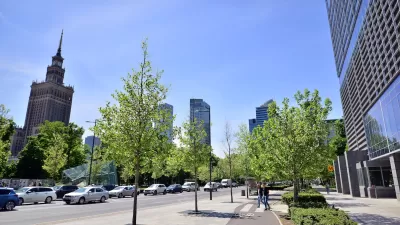Over the first 40 days they've been in operation, Chicago's nine new speed enforcement cameras have issued warnings to 200,000 drivers. Politicians and reporters are skeptical about the city's motivation for installing the cameras.
For John Greenfield, by speculating on the financial motivation for installing the cameras, reporters and elected leaders are ignoring the severity of the safety problem the speeding data reveals.
"You would think that the [Chicago] Tribune would respond to the [data on the volume of warnings] with a story about how these numbers indicate that Chicago has a reckless driving epidemic," observes Greenfield. "Perhaps the paper would acknowledge that the cameras represent an appropriate enforcement measure. Instead, the Trib clung to its hypothesis that this safety initiative is merely a money grab by the mayor, with the headline 'Emanuel speed cameras may bring in more revenue than expected.'”
"The Trib piece fails to mention that any revenue generated by the speed cameras would be earmarked for traffic safety and violence prevention efforts such as crossing guards and police officers around schools, infrastructure like crosswalks and warning signs, plus after-school, anti-violence and job-training programs," he adds.
FULL STORY: 200,000-Plus Warnings in 40 Days Proves We Have a Speeding Epidemic

Manufactured Crisis: Losing the Nation’s Largest Source of Unsubsidized Affordable Housing
Manufactured housing communities have long been an affordable housing option for millions of people living in the U.S., but that affordability is disappearing rapidly. How did we get here?

Americans May Be Stuck — But Why?
Americans are moving a lot less than they once did, and that is a problem. While Yoni Applebaum, in his highly-publicized article Stuck, gets the reasons badly wrong, it's still important to ask: why are we moving so much less than before?

Using Old Oil and Gas Wells for Green Energy Storage
Penn State researchers have found that repurposing abandoned oil and gas wells for geothermal-assisted compressed-air energy storage can boost efficiency, reduce environmental risks, and support clean energy and job transitions.

Poorest NYC Neighborhoods Pay Price for Delivery Boom
The rise of ‘last-mile’ e-commerce warehouses — and their attendant truck traffic and air pollution — is disproportionately impacting the most historically disadvantaged parts of the city.

Greening Oakland’s School Grounds
With help from community partners like the Trust for Public Land, Oakland Unified School District is turning barren, asphalt-covered schoolyards into vibrant, green spaces that support outdoor learning, play, and student well-being.

California Governor Suspends CEQA Reviews for Utilities in Fire Areas
Utility restoration efforts in areas affected by the January wildfires in Los Angeles will be exempt from environmental regulations to speed up the rebuilding of essential infrastructure.
Urban Design for Planners 1: Software Tools
This six-course series explores essential urban design concepts using open source software and equips planners with the tools they need to participate fully in the urban design process.
Planning for Universal Design
Learn the tools for implementing Universal Design in planning regulations.
Heyer Gruel & Associates PA
City of Moreno Valley
Institute for Housing and Urban Development Studies (IHS)
City of Grandview
Harvard GSD Executive Education
Salt Lake City
NYU Wagner Graduate School of Public Service
City of Cambridge, Maryland





























